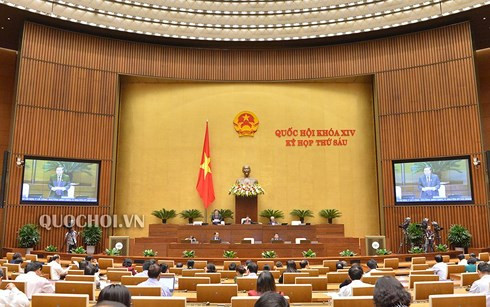Many hot issues have entered the National Assembly.
It can be said that a panoramic picture of society was vividly recreated in the question and answer sessions at the National Assembly last week.
The second working week of the National Assembly ended with the outstanding activity of questioning Government members who are Ministers and heads of sectors, a very important activity in each session, leaving an impression of the democratic spirit and responsibility of National Assembly deputies, Government members and heads of sectors in the face of important and specific issues that voters and people across the country are interested in.
This is the fifth time the 14th National Assembly has conducted the question and answer session for National Assembly deputies. The question and answer session can be considered a mid-term review of the implementation of the National Assembly's resolutions on thematic supervision and questioning, demonstrating the National Assembly's responsible attitude in supervising to the end the implementation of the National Assembly's decisions on important issues of the country, issues of concern to voters and the people.
|
| Overview of the working session of the 14th National Assembly. |
The new highlight of the question-and-answer session at this National Assembly session is that there is no question grouping, no "hard" list of people to answer questions, but all members of the Government and heads of sectors with related content must answer. Perhaps it is this openness that has created a very lively debate atmosphere in the parliament. With a question time of 1 minute and a response time of 3 minutes, the answers of the Ministers and heads of sectors also go straight to the point, many opinions of National Assembly deputies affirmed that changing the method helps improve the efficiency and quality of question-and-answer activities, thoroughly resolving issues that voters and National Assembly deputies are interested in and have opinions about.
One noticeable point at the question and answer session was the heated debate between the National Assembly deputies themselves in the question and answer session. During the 3 days of questioning, 82 deputies debated, many of which National Assembly deputies debated with each other. For example, in the question and answer session on the morning of November 1, there was a heated debate between two deputies, Luu Binh Nhuong, Doan Ben Tre, and Nguyen Huu Cau, Doan Nghe An, about the data reflecting violations by the Public Security sector.
Through the public debates in the parliament of the delegates, it shows multi-dimensional perspectives on an issue, giving comments and suggestions that have helped the Ministers and heads of sectors have a deeper insight to manage more effectively. Without discussing the right or wrong of the debated contents, because the approach to the issue of each delegate from different angles and conditions is still different, but clearly, the critical debates right between the delegates in the question and answer session have contributed to clearly demonstrating the spirit and atmosphere of a democratic and transparent National Assembly.
But in that spirit of debate, voters also expect to truly form a "culture of debate", frankly, in the spirit of giving opinions, building, not bringing personal motives into the parliament, not stereotyping personal views... Through debate, we will create high consensus in legislative activities, supervision and decision-making on national and people's livelihood issues.
At the end of three days of questioning, in a speech clarifying a number of related issues under the Government's responsibility and directly answering questions before the National Assembly, Prime Minister Nguyen Xuan Phuc affirmed that the future depends on our determination and actions today. Therefore, more than ever, it is necessary to resolutely perfect the socialist-oriented market economic institution, focus on judicial reform, protect property rights and civil rights, well implement the principle of democratic centralism, control power; fight uncompromisingly against corruption, negativity, waste, buying positions, power, and projects, and promote discipline and order in the entire political system. In particular, continue to promote streamlining the payroll, making the state apparatus more streamlined, effective and efficient; and strongly improve the investment and business environment.
Also during the working week, the National Assembly spent time listening to General Secretary and President Nguyen Phu Trong present a report on the proposal for the National Assembly to ratify the Comprehensive and Progressive Agreement for Trans-Pacific Partnership (CPTPP) and related documents. General Secretary and President Nguyen Phu Trong emphasized that participating in and soon ratifying the CPTPP will help Vietnam demonstrate its strong commitment to comprehensive and extensive international innovation and integration; affirming Vietnam's important role and geopolitical position in Southeast Asia as well as the Asia-Pacific region, truly enhancing Vietnam's position in ASEAN, in the region as well as in the international arena.
According to General Secretary and President Nguyen Phu Trong, the CPTPP Agreement, when implemented, will contribute to strengthening the intertwining of interests and deepening the relationship between Vietnam and CPTPP member countries, especially member countries with strategic partnerships with our country. However, in addition to the advantages, joining the CPTPP also poses challenges in terms of socio-economics, budget revenue, and improving the legal and institutional framework. The opening of economic activities, along with regulations on labor, transparency, anti-corruption, etc., requires us to be proactive, make efforts to innovate, continue to improve legal regulations, and establish management mechanisms to comply with international treaties while also firmly ensuring Vietnam's political and social stability.
Entering the third working week, in addition to focusing on giving opinions on a number of important Law Projects, the National Assembly will spend time voting to pass the Resolution on the 2019 socio-economic development plan and the Resolution on the 2019 state budget estimate./.

